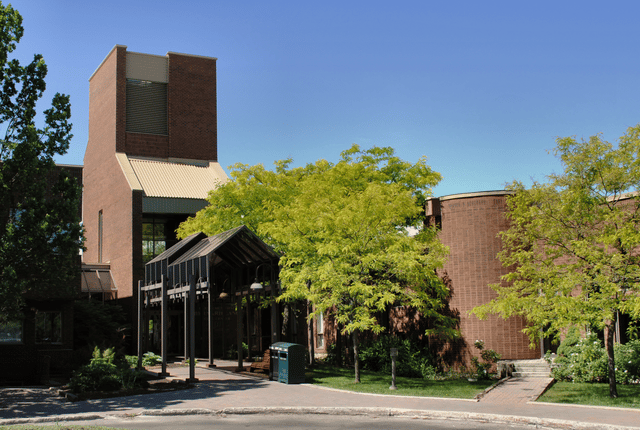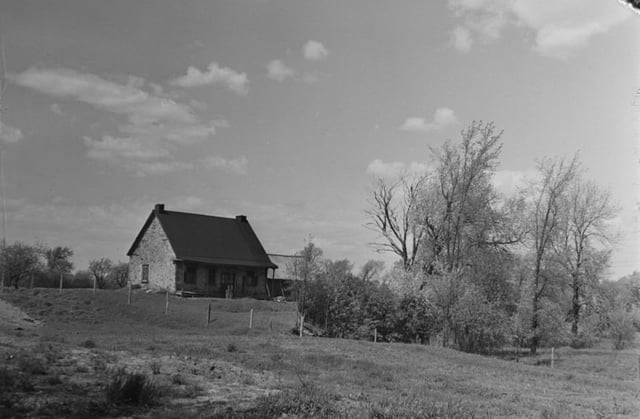Côte-Saint-Luc

Côte-Saint-Luc

Côte-Saint-Luc | |
|---|---|
City | |
| City of Côte-Saint-Luc | |
 Location of Côte-Saint-Luc on the Island of Montreal. (Grey areas indicate demerged municipalities). | |
| Coordinates:45°28′N 73°40′W [16] | |
| Country | |
| Province | |
| Region | Montréal |
| Incorporated | 1903 |
| City | 1958 |
| Electoral Districts Federal | Mount Royal |
| Provincial | D'Arcy-McGee |
| Government | |
| • Mayor | Mitchell Brownstein |
| • Federal MP(s) | Anthony Housefather (LIB) |
| • Quebec MNA(s) | David Birnbaum (PLQ) |
| Area | |
| • Total | 6.95 km2 (2.68 sq mi) |
| Population (2006)[4] | |
| • Total | 31,395 |
| • Density | 4,516.0/km2(11,696/sq mi) |
| • Change (2001-06) | |
| • Dwellings | 14,371 |
| Time zone | UTC-5 (Eastern (EST)) |
| • Summer (DST) | UTC-4 (EDT) |
| Postal code(s) | H4V, H4W, H4X |
| Area code(s) | (514) and (438) |
| Website | cotesaintluc.org [17] |
Côte-Saint-Luc (French pronunciation: [kot sɛ̃ lyk]), also spelled Côte Saint-Luc,[5] is an on-island suburb of Montreal in Quebec, Canada.
Côte-Saint-Luc | |
|---|---|
City | |
| City of Côte-Saint-Luc | |
 Location of Côte-Saint-Luc on the Island of Montreal. (Grey areas indicate demerged municipalities). | |
| Coordinates:45°28′N 73°40′W [16] | |
| Country | |
| Province | |
| Region | Montréal |
| Incorporated | 1903 |
| City | 1958 |
| Electoral Districts Federal | Mount Royal |
| Provincial | D'Arcy-McGee |
| Government | |
| • Mayor | Mitchell Brownstein |
| • Federal MP(s) | Anthony Housefather (LIB) |
| • Quebec MNA(s) | David Birnbaum (PLQ) |
| Area | |
| • Total | 6.95 km2 (2.68 sq mi) |
| Population (2006)[4] | |
| • Total | 31,395 |
| • Density | 4,516.0/km2(11,696/sq mi) |
| • Change (2001-06) | |
| • Dwellings | 14,371 |
| Time zone | UTC-5 (Eastern (EST)) |
| • Summer (DST) | UTC-4 (EDT) |
| Postal code(s) | H4V, H4W, H4X |
| Area code(s) | (514) and (438) |
| Website | cotesaintluc.org [17] |
History

Farm in Côte-Saint-Luc in 1941
Incorporated in 1903, Côte-Saint-Luc grew from a town to a city, in 1958.
Throughout the 1920s, the town grew quickly and accepted many immigrant populations leaving Montreal, notably German-Jewish, Scottish, and British families, plus their descendants. By 1935, the population reached 5,000. Railway development and industrial activities were relocated to the north. An example of this is an old farmhouse, near the intersection of Westminster and Côte-Saint-Luc, which today it is a strip mall.
After many years of debate and disagreement, Côte-Saint-Luc agreed to the extension of Cavendish Blvd. in Côte-Saint-Luc, most likely through an indirect route, to Cavendish Blvd. in the borough of Saint-Laurent, over the Canadian Pacific railyards.
Côte-Saint-Luc (and all of Montreal Island's other suburbs) was forced to merge with the city of Montreal on January 1, 2002, but was given the opportunity to demerge from the city in 2004. It was merged with its neighbouring suburbs of Hampstead and Montreal West to form the borough of Côte-Saint-Luc—Hampstead—Montréal-Ouest. In a referendum held on June 20, 2004 more than 87 percent of Côte-Saint-Luc residents voted to demerge and Côte-Saint-Luc was re-established as a separate city on January 1, 2006.
Government
The leaders of the demerger movement were all elected (or acclaimed) to the new city council, and Anthony Housefather was elected mayor. Following Housefather's election as the Member of Parliament for the Mount Royal riding, of which the city is a part, Mitchell Brownstein was acclaimed as Mayor on Friday, March 11, 2016. During a subsequent by-election to replace Brownstein's vacant seat, Sidney Benizri was elected as councillor, garnering 325 of the 771 votes cast (42.2%).
The City Manager is Tanya Abramovitch[6] and Nadia Di Furia the Associate City Manager and Director of Human Resources.
The City of Côte-Saint-Luc is led by the mayor and eight councillors. The councillors (as of November 2017) are:[7]
Oren Sebag (District 1)
Mike Cohen (District 2)
Dida Berku (District 3)
Steven Erdelyi (District 4)
Mitch Kujavsky (District 5)
David Tordjman (District 6)
Sidney Benizri (District 7)
Ruth Kovac (District 8)
Public services
Côte-Saint-Luc is served by a unique Emergency Medical Services (EMS) first responder system. The only volunteer first responder service on the island of Montreal, the Emergency Medical Services respond to more than 3,000 calls for help every year. Advanced care and transportation to local hospitals is provided by Urgences-santé. In 2008-2009, the Montreal Fire Department implemented an island-wide first responder system. It was set to replace the Côte-Saint-Luc EMS; however, the city fought to keep their system. A private member's bill was passed in the National Assembly of Quebec to exclude Côte-Saint-Luc from the Montreal Fire Department.
Côte-Saint-Luc also has a full-time Public Security Department that enforces municipal by-laws and in 2006 launched the Volunteer Citizens on Patrol (vCOP) program that allows residents to help deter crime.
The city's Eleanor London Côte-Saint-Luc Public Library was named in honour of Eleanor London, the first librarian hired to set up whatever vision of a library she wanted. She continued in the capacity of chief librarian for 36 years. The Eleanor London Côte-Saint-Luc Library is one of few libraries in North America that is open every day of the year.
The Cavendish Mall, now known as Quartier Cavendish, used to be a focal point with famous shopping areas such as Steinberg's, Eaton's and Discus. The mall has failed over the years, but exists in part with a loyal following on Facebook
Geography
Along with Hampstead and Montreal West, Côte-Saint-Luc forms an enclave within Montreal. Côte-Saint-Luc also has two exclaves sandwiched between Hampstead and the city of Montreal. The larger one contains the residential development North of Hampstead and Decarie Square shopping centre, while the smaller one consists of just fifteen residential buildings on Macdonald Ave.
Demographics
| Historical populations | ||
|---|---|---|
| Year | Pop. | ±% |
| 1966 | 20,546 | — |
| 1971 | 24,380 | +18.7% |
| 1976 | 25,721 | +5.5% |
| 1981 | 27,531 | +7.0% |
| 1986 | 28,582 | +3.8% |
| 1991 | 29,955 | +4.8% |
| 1996 | 29,365 | −2.0% |
| 2001 | 29,434 | +0.2% |
| 2006 | 31,395 | +6.7% |
| 2011 | 32,321 | +2.9% |
| [8] | ||
The City of Côte-Saint-Luc is a bilingual, multicultural community. Approximately 70 percent of the population speaks English as their home language and approximately 15 percent speak French as their home language with the other 15 percent of the population speaking another language at home. When divided amongst preferred official language of use, English is the preferred language of approximately 80 percent of the population and French 20 percent. The Jewish community makes up the largest ethnic community in Côte-Saint-Luc, while the city also has a substantial Italian community. [9]
Mother tongues
Statistics for the population according to mother tongue (the first language learned and still remembered) vary significantly from the statistics for home language (the language spoken most often at home), as well as also varying significantly from the statistics for official language usage. The 2006 census found that about 47% of residents had English as a mother tongue (including persons who had more than one mother tongue), while about 17% had French as a mother tongue (also including persons who had more than one mother tongue). The next most common mother tongues were Russian, Yiddish, Hebrew, Romanian, Spanish, Hungarian, Italian, Polish, and Persian.
| Mother Tongue (2016)[10] | Population | Percentage |
|---|---|---|
| English | 12,875 | 40.52% |
| French | 6,030 | 18.98% |
| English and French | 510 | 1.61% |
| English and a non-official language | 200 | 0.63% |
| French and a non-official language | 260 | 0.82% |
| English, French and a non-official language | 185 | 0.58% |
| Russian | 2,175 | 6.85% |
| Persian | 1,410 | 4.44% |
| Hebrew | 935 | 2.94% |
| Romanian | 885 | 2.79% |
| Spanish | 720 | 2.27% |
| Italian | 655 | 2.06% |
| Yiddish | 610 | 1.92% |
| Arabic | 490 | 1.54% |
| Tagalog | 455 | 1.43% |
| Hungarian | 440 | 1.38% |
| Korean | 280 | 0.88% |
| Bulgarian | 275 | 0.87% |
| Mandarin | 235 | 0.86% |
| Polish | 235 | 0.74% |
| German | 165 | 0.52% |
| Portuguese | 135 | 0.42% |
| Ukrainian | 130 | 0.41% |
| Cantonese | 115 | 0.36% |
Ethnic origin
| Ethnicity[9] | Population | Percentage (%) |
|---|---|---|
| Jewish | 12,435 | 39.8% |
| Russian | 4,190 | 13.4% |
| Polish | 3,140 | 10.1% |
| Canadian | 2,605 | 8.3% |
| Moroccan | 2,385 | 7.6% |
| Romanian | 1,980 | 6.3% |
| Italian | 1,320 | 4.2% |
| French | 1,135 | 3.6% |
| Hungarian | 1,055 | 3.4% |
| Filipino | 1,025 | 3.3% |
Education
The Commission scolaire Marguerite-Bourgeoys (CSMB) operates two Francophone primary schools—École de la Mosaïque and École des Amis-du-Monde—in Côte-Saint-Luc.[12] The English Montreal School Board operates a French immersion school—Merton School, John Grant and Mountainview High Schools and the Marymount Adult Centre. There are a number of private schools in the city, including JPPS-Bialik, Hebrew Academy, Maimonides and Yeshiva Yavne.
Notable residents
Former residents of Côte-Saint-Luc include politician and lawyer Irwin Cotler, actor William Shatner, and poet Irving Layton. Sidney Shoham, founding Rabbi of Beth Zion Congregation, spent more than 60 years as a resident and leader of the Cote Saint-Luc Jewish community. Other residents included Montreal Expos all-star catcher Gary Carter. Comedy screenwriter Ricky Blitt and older brother Barry Blitt, a magazine illustrator, were raised there. Author Gordon Korman grew up in Côte-Saint-Luc, as did popular science author and cognitive psychologist Steven Pinker.
See also
List of former boroughs
Montreal Merger
Municipal reorganization in Quebec
List of enclaves